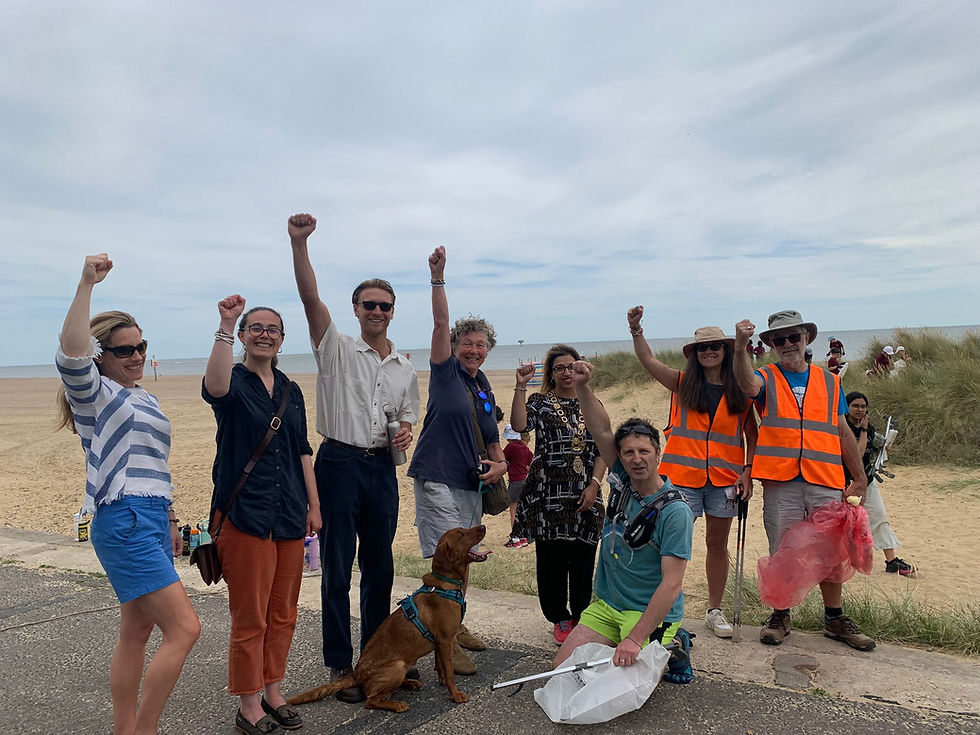The Power of a Beach Clean-Up: Why Every Effort Matters
- Nathalia Fisher
- Mar 13, 2025
- 3 min read
Updated: Mar 28, 2025
Walk along any coastline, and you'll find more than just seashells and driftwood. Plastic bottles, fishing nets, and forgotten fragments of human waste litter the shore, each piece telling a story of consumption, convenience, and neglect. But here’s the good news—when people step in to clean up, they’re not just removing rubbish; they’re actively disrupting the cycle of pollution. Beach clean-ups do far more than make a place look tidy—they protect marine life, reduce microplastic contamination, and drive real change in how we think about waste.

More Than Just a Beach Clean-up
Sure, beach clean-ups make our shorelines look better, but their impact runs far deeper than aesthetics. A study in Norway found that removing plastic waste from beaches led to a staggering 99.5% reduction in microplastics in surrounding waters and sand within a year. That’s because plastic left in the environment doesn’t just sit there—it breaks down into microscopic fragments that pollute our waterways, threaten marine life, and even end up in our food chain. Every single clean-up is a direct, hands-on way to stop this cycle before it gets worse.
Shifting Mindsets, One Piece at a Time
Research shows that those who participate in clean-ups are far less likely to litter themselves. Why? Because once you’ve seen firsthand the sheer amount of waste that washes ashore, it’s impossible to ignore the bigger picture. Clean-ups turn passive observers into active environmental stewards. They spark conversations, inspire new habits, and encourage people to question where all this waste is coming from in the first place.

Holding Polluters Accountable
Beach clean-ups don’t just collect plastic—they collect data. Studies from Greenpeace and National Geographic have revealed that major brands are repeatedly responsible for the bulk of plastic pollution found on beaches worldwide. By documenting and analysing what’s picked up, clean-ups provide evidence that can be used to push corporations and policymakers toward systemic change—whether it’s stronger regulations on plastic production, better waste management, or bans on the worst offenders like polystyrene and ghost gear.
Community and Connection
There’s something special about standing side by side with strangers, cleaning up a beach together. It builds community. It reinforces the idea that we’re all connected—to each other and to our environment.

The Next Step is Yours
The evidence is clear—beach clean-ups make a difference. They prevent pollution, change behaviours, provide critical data, and strengthen communities. But the work doesn’t stop at picking up plastic. We need to advocate for better policies, push for systemic change, and rethink our relationship with waste from the source.
So here’s the challenge: When’s the last time you took part in a clean-up? If you haven’t yet, will you join one? If you have, how did it change the way you see plastic pollution? Let’s keep the conversation going—share your thoughts in the comments.
Join Us for the Lincolnshire Spring Beach Clean!
Ready to take action? Join us on Sunday, March 30th, 2025, for the Spring Beach Clean at:
📍 Skegness Beach – 2:00 PM to 4:00 PM https://w3w.co/launch.copy.vision
This Spring Beach Clean is more important than ever. A recent collision in the North Sea spilled billions of plastic nurdles into our waters—tiny pellets that devastate marine life and wash up along our coastline. This pollution is particularly dangerous for seabirds like the Fulmars of Hunstanton, whose population has halved due to plastic ingestion.
The Coastline Runner and Marine Conservation Society are leading this effort with the support of Skegness Aquarium, Skegness Council, and local schools. Volunteers will receive a 50% discount on Skegness Aquarium entry, and all clean-up equipment will be provided.
It’s free to join—just bring your enthusiasm!
Ahead of the clean-up, Luke Douglas-Home – aka The Coastline Runner – will be speaking to students at Skegness Grammar School on Monday, March 24th, at 1:30 PM, inspiring the next generation to take action against plastic pollution.
Every pair of hands helps. Let’s clean up and protect our coast together!



Comments